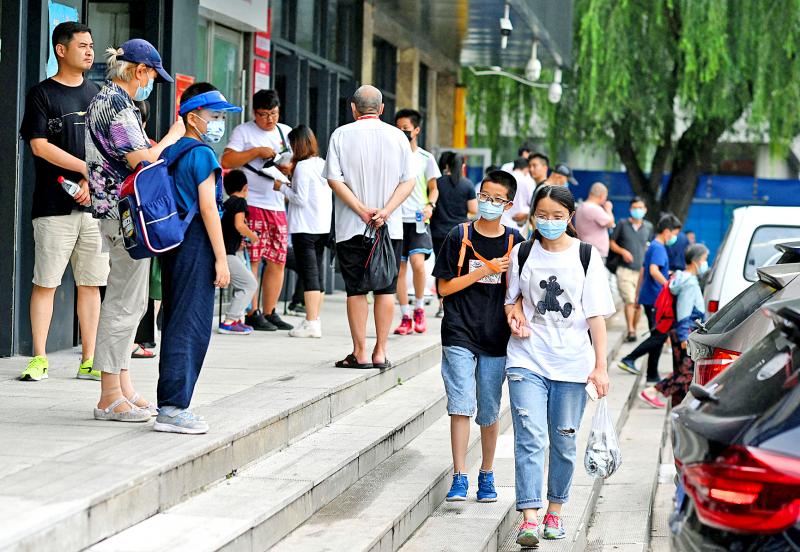New Oriental Education & Technology Group Inc (新東方教育科技集團) fired tens of thousands of employees, the biggest layoffs disclosed since China embarked on a wide-ranging crackdown on private enterprises more than a year ago.
Yu Minhong (俞敏洪), founder and chairman of the Chinese tutoring giant, revealed in a WeChat post over the weekend that the company dismissed 60,000 workers last year and saw revenue fall 80 percent after ending all K-9 tutoring services following Beijing’s overhaul of the US$100 billion after-school education sector in July last year. That is nearly three-quarters of its more than 81,000 employees as of May.
“In 2021, New Oriental encountered too many unforeseen events from factors such as policy, the pandemic and international relations,” Yu wrote. “Much of our business remains in a state of uncertainty.”

Photo: AFP
Once one of China’s leading private education providers, New Oriental saw 90 percent of its market value wiped out last year after Beijing banned tutoring companies from making profits and raising capital.
A combination of severance payments, tuition refunds and terminated leases for teaching sites cost the firm nearly 20 billion yuan (US$3.14 billion), Yu said in the post.
Operating losses might be wider than expected at US$500 million in the fiscal year ending in May, said Catherine Lim, a senior industry analyst for Bloomberg Intelligence.
New Oriental and rival TAL Education Group (好未來教育集團) could see losses extend to 2024 as government price controls on classes and bans on weekend and holiday lessons handicap revenues, she wrote in a research note.
New Oriental has sought to increase investments into businesses targeting college students and overseas Chinese markets, while exploring new areas such as livestreaming and the sale of agricultural products.
Finding a new direction is a focus for the firm this year, Yu said, adding that he took part in a one-hour live broadcast last week that sold nearly 200,000 books.
The regulatory shifts in the edtech space, mirroring a broader sweeping crackdown on Chinese Internet companies, have forced major players to adapt to survive, including by expanding nonacademic curricula and providing some after-school classes for free.
Rivals have also trimmed workforces, with ByteDance Ltd (字節跳動) firing hundreds of employees last year. Beijing-based TAL cut 90,000 jobs, local media outlet Late Post reported without saying where it obtained the information.
On Dec. 31 last year, local regulators in big cities such as Beijing and Shanghai unveiled their pricing standards for nonprofit K-9 tutoring, signaling that a relaunch of online classes could be imminent.
Fees for online classes are guided at 20 yuan per session, with companies allowed to charge a premium of no more than 10 percent
New Oriental is among at least 10 firms, including ByteDance and Tencent Holdings Ltd (騰訊)-backed Yuanfudao (猿輔導), that have obtained licenses to offer online classes, according to a Caixin report.

Taiwan Semiconductor Manufacturing Co (TSMC, 台積電) yesterday said that its investment plan in Arizona is going according to schedule, following a local media report claiming that the company is planning to break ground on its third wafer fab in the US in June. In a statement, TSMC said it does not comment on market speculation, but that its investments in Arizona are proceeding well. TSMC is investing more than US$65 billion in Arizona to build three advanced wafer fabs. The first one has started production using the 4-nanometer (nm) process, while the second one would start mass production using the

A TAIWAN DEAL: TSMC is in early talks to fully operate Intel’s US semiconductor factories in a deal first raised by Trump officials, but Intel’s interest is uncertain Broadcom Inc has had informal talks with its advisers about making a bid for Intel Corp’s chip-design and marketing business, the Wall Street Journal reported, citing people familiar with the matter. Nothing has been submitted to Intel and Broadcom could decide not to pursue a deal, according to the Journal. Bloomberg News earlier reported that Taiwan Semiconductor Manufacturing Co (TSMC, 台積電) is in early talks for a controlling stake in Intel’s factories at the request of officials at US President Donald Trump’s administration, as the president looks to boost US manufacturing and maintain the country’s leadership in critical technologies. Trump officials raised the

‘SILVER LINING’: Although the news caused TSMC to fall on the local market, an analyst said that as tariffs are not set to go into effect until April, there is still time for negotiations US President Donald Trump on Tuesday said that he would likely impose tariffs on semiconductor, automobile and pharmaceutical imports of about 25 percent, with an announcement coming as soon as April 2 in a move that would represent a dramatic widening of the US leader’s trade war. “I probably will tell you that on April 2, but it’ll be in the neighborhood of 25 percent,” Trump told reporters at his Mar-a-Lago club when asked about his plan for auto tariffs. Asked about similar levies on pharmaceutical drugs and semiconductors, the president said that “it’ll be 25 percent and higher, and it’ll

CHIP BOOM: Revenue for the semiconductor industry is set to reach US$1 trillion by 2032, opening up opportunities for the chip pacakging and testing company, it said ASE Technology Holding Co (日月光投控), the world’s largest provider of outsourced semiconductor assembly and test (OSAT) services, yesterday launched a new advanced manufacturing facility in Penang, Malaysia, aiming to meet growing demand for emerging technologies such as generative artificial intelligence (AI) applications. The US$300 million facility is a critical step in expanding ASE’s global footprint, offering an alternative for customers from the US, Europe, Japan, South Korea and China to assemble and test chips outside of Taiwan amid efforts to diversify supply chains. The plant, the company’s fifth in Malaysia, is part of a strategic expansion plan that would more than triple